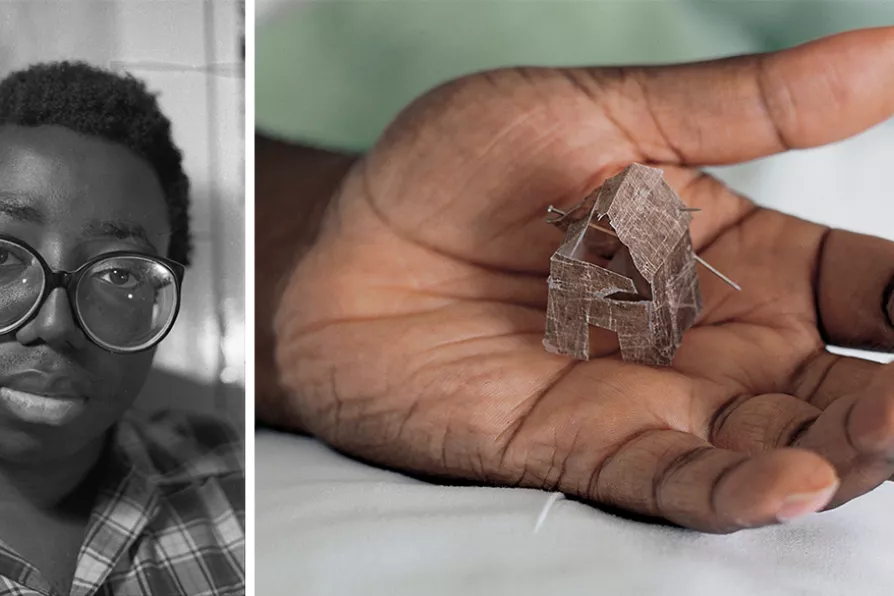JAN WOOLF applauds the necessarily subversive character of the Palestinian poster in Britain

 (L) Portrait of Donald Rodney taken at home (1989); (R) Donald Rodney, In The House of My Father (1997)
(L) Portrait of Donald Rodney taken at home (1989); (R) Donald Rodney, In The House of My Father (1997)
Donald Rodney
Spike Island, Bristol
SUMMER is not in the air at Spike Island, Bristol, where the gallery hosts a major retrospective of the trailblazing Birmingham artist, Donald Rodney. Rodney, as a short film included in the exhibition reveals, rarely saw the summer sunshine, as his lifelong condition of sickle cell anaemia usually left him hospitalised throughout the season.
Rodney’s struggle with his condition, which would lead to his tragically early death at 36 in 1998, informs much of his work, which is dark, painful and unsparing, seeming to anticipate and confront a death that hectored him all his life.
While this is no sunny summer exhibition fare, Spike Island’s retrospective reveals a major British artist with a distinctive, original voice and a versatile artistic practice that spanned big painted canvasses and photo collages to conceptual work.
Rodney first gained recognition throughout the 1980s as a founding member of the BLK Art Group alongside contemporaries such as Keith Piper, Claudette Johnson and Eddie Chambers.
His reputation as an acerbic social provocateur precedes him: one work, entitled Bete Noire, absent from this exhibition, notoriously juxtaposed a doll of The A-Team’s Mr T with a Robert Mapplethorpe photo of a large black penis. Even with this missing, Spike Island’s retrospective is full of work that exhibits Rodney’s vision of the grim, absurd carnival of late 20th century life in all its just-below-surface horror and confusion.
This caustic reappropriation of the iconography of pop culture is one of Rodney’s strongest tools — a life-size, jump-scaring puppet of Michael Jackson in a fairground “laughing policemen” machine being a memorable example.
Elsewhere, Rodney chops up posters of 1950s Hollywood Westerns, distorting the self-mythologising discourses of white conquest into self-parody.
Indeed, few artists better make lucid the ways in which grim archetypes, inherited from centuries of white dominance and plunder, tacitly re-emerge in our cultural debris. Through Rodney’s eyes, the MTV era becomes a thinly veiled minstrel show; OJ Simpson and Mike Tyson are the modern Mandingoes — the muscular, "well-bred" and sexually powerful black man that dates back to slave auctions.
This incendiary, inward-looking work stands in defiance of the art world’s ancient distinctions — never that convincing — between the oppositional spheres of the cultural, the personal, and the political.
Working in the mid-1980s, the BLK art group were familiar with an artistic mainstream that still dismissed black art as inferior to a canon of (always white, always European, always male) masters that purported to “transcend” the personal and the political.
In contrast, Rodney’s art was forged out of lifelong personal strife — and as a black man living in a systemically racist society, this personal strife was always political.
Rodney pulls no punches.
“The 20th century has been cursed with an art that cannot be understood,” reads an early interview on display in the exhibition. “The role of my work is to be understood by all folk and not to be cloaked in elitist ‘art’ mystique. The role of my art is to inform, educate, stimulate and agitate. It is my wish to use accessibility as a weapon for political liberation and subversion.”
And he does. Rodney’s work is full of urbane references to other major artists, but you never sense that familiar masturbatory air of art-world self-reference that’s sold these days as “intertextuality.”
A repurposing of the visual codes of Picasso’s Guernica, for instance, onto the context of apartheid South Africa is piercing — and so unapologetically forthright that it provides no coded nods and winks to the mannered and the cultured who lurk at art gallery openings, pontificating. Just plain-speaking abhorrence.
It’s a testament to the breadth of Rodney’s oeuvre that the Spike Island retrospective feels like an exhibition without a clear centrepiece; and to Rodney’s artistic dynamism that no single style ever settles as definingly his.
His Brittania Hospital paintings (1988) — themselves mosaics of tiled X-ray plates — are merciless in their vision of British society from a hospital bed and command attention in the centre of the gallery.
But just as memorable is the exhibition’s smallest work — In The House of my Father (1996-7) — which fashions Rodney’s own dried skin, removed in one of his regular sickle-cell treatment operations, into a tiny, thumb-size model house.
This is a tough exhibition: Rodney’s suffering comes through in all his work, and visceral is an apt adjective for the tough, corporeal force it exerts. But its clear there is a catharsis to Rodney’s artistic practice too, for artist and spectator alike.
A sobering takeaway is how relevant Rodney’s themes of racial injustice and institutional inequality still feel today — as if not much has changed in the decades since his work was produced. And while this is characteristically forward-thinking fare from the place that has emerged Bristol’s best art gallery, you ask: as our art institutions catch up, when might the world?
Runs until September 8 at Spike Island: www.spikeisland.org.uk.
Tours to Nottingham Contemporary September 27 to January 5 2025, and Whitechapel Gallery, London, February 12 to May 18 2025.













